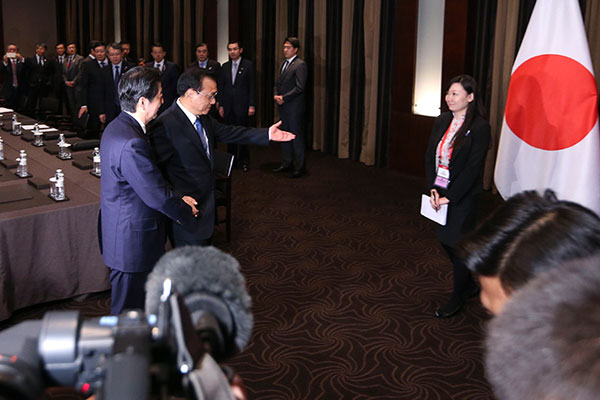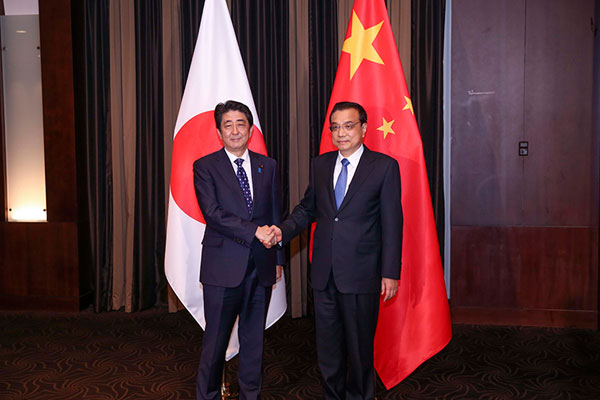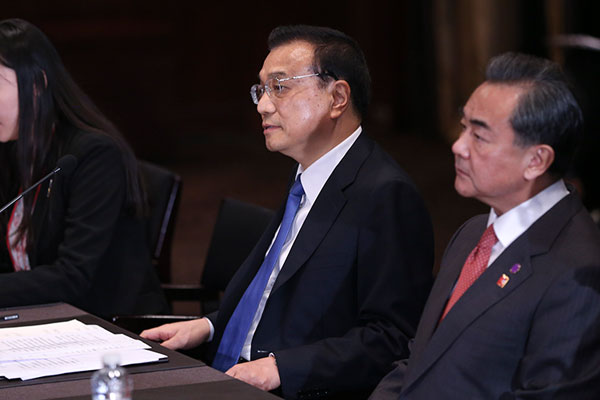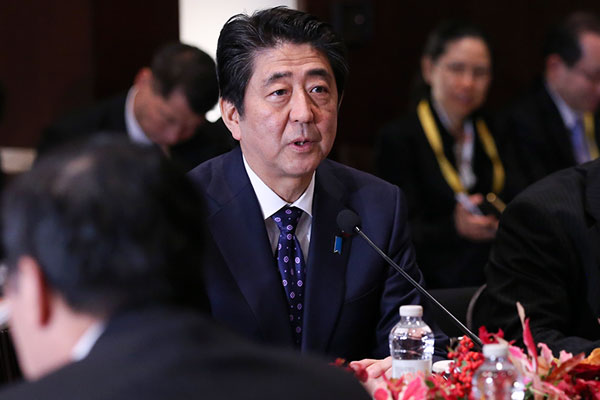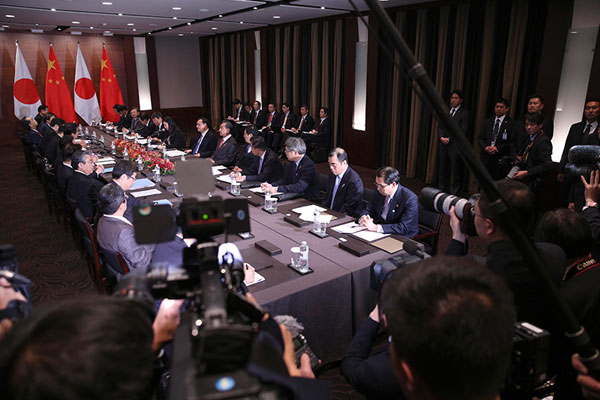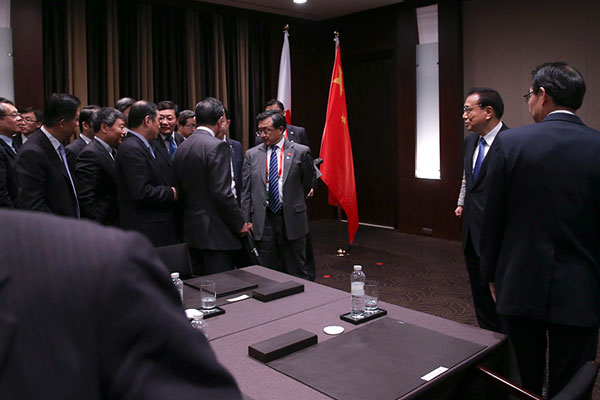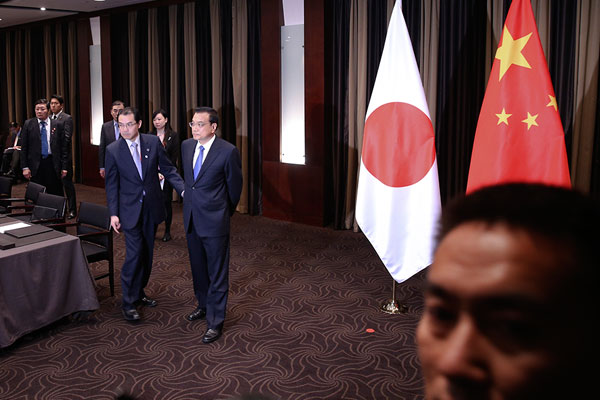
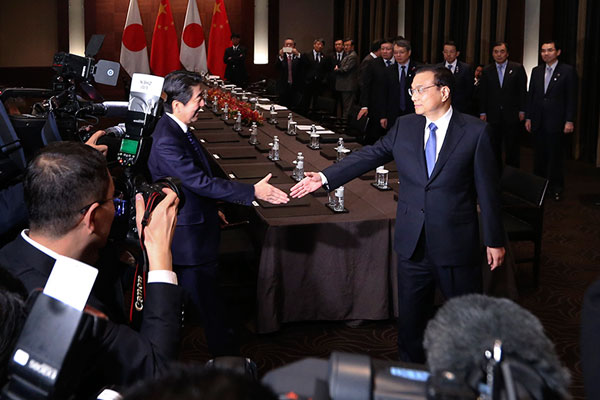
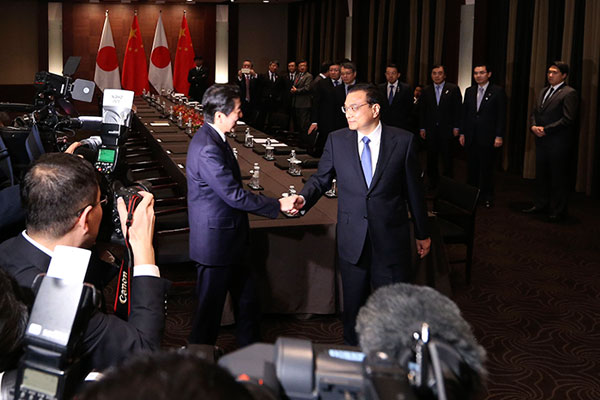
Premier Li Keqiang urged Japan to tackle the history issue “in a responsible manner” and “undertake positive policies toward China” during his meeting with his Japanese counterpart Shinzo Abe in Seoul on Nov 1.
At the invitation of Japan, the meeting was held at the hotel hosting Premier Li. Both leaders attended the sixth China-Japan-ROK Leaders Meeting earlier in the day.
Premier Li said that both China and Japan are countries that have great influence on Asia and the world. “In the past several years, the China-Japan relationship has not been on track, and the Japanese side is clear about the reasons behind it. Such a profound lesson deserves serious learning,” Premier Li added.
Since the end of 2014, with joint efforts by both sides, the bilateral relationship has gradually broken the deadlock and has maintained the momentum of getting back to stability, the Premier said.
However, the sensitivity and the complexity of the bilateral relationship are still there and there is still a long way to go for it to return to the track of normal development, he said.
Premier Li proposed four priority tasks for both sides:
- To firmly stick to the general direction of the bilateral relationship. China calls for honoring the principles and the spirits of the four China-Japan political documents, and fully implementing the four principled consensuses reached by both sides last year to improve the relationship, following the spirits of “taking the lessons from history and facing the future” and advancing the China-Japan strategic and mutually beneficial relationship. It is hoped Japan will undertake positive policies toward China, meet China halfway and achieve a steady improvement of the relationship.
- To properly tackle, manage and control sensitive issues. The history issue matters to the political foundation of the China-Japan relationship as well as the feelings of the 1.3 billion Chinese people. It is hoped that Japan will fully perceive the great sensitivity, tangibly honor its solemn commitments made, effectively face and reflect on the history, and properly tackle the relevant issues in a responsible manner.
- To nurture mutual trust. The two sides should concretely implement the idea of “take each other as cooperative partners and do not pose a threat to each other” and “support the peaceful government of each other”, which has been stated by the fourth China-Japan political document. China will firmly stay committed to the path of peaceful development, and it is hoped Japan will continue to walk along the direction of peaceful development, respect the concerns of Asian neighbors in military and security fields, and do more to facilitate regional peace and stability.
- To deepen pragmatic exchanges and cooperation. China and Japan are respectively the second- and third-largest economies in the world, and it is necessary to strengthen communication on macroeconomic policy and jointly address challenges in the context of the sluggish recovery of world economy.
Abe said the two countries shoulder duties to regional peace and stability as well as world economic development, and they should jointly make contribution for this. “I’m ready to unswervingly honor the principles of the four Japan-China political documents, follow the ideas for building the Japan-China strategic and mutually beneficial relationship, and further improve and develop the Japan-China relationship,” Abe said.
Japan will take the path of peace further and stick to its defense policy commitment on self-defense, Abe said.
Abe noted that China’s economy has attracted global attention and it matters to Japan’s economic development. As two leading economies in the world, it is of great importance for Japan and China to strengthen their economic ties.
Japan is ready to further strengthen bilateral cooperation in fields such as finance, energy saving and environmental protection, and Japan is “willing to embark on active negotiations” for an early realization of the China-Japan-ROK free trade agreement, Abe said.
